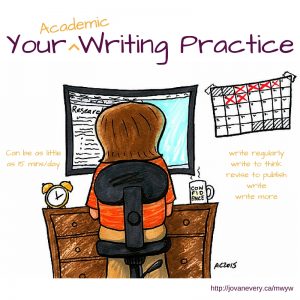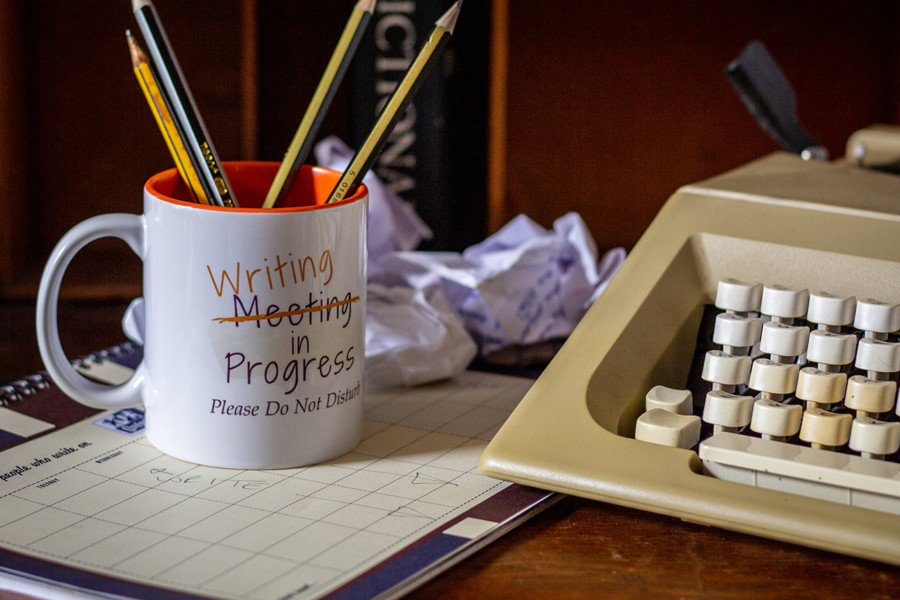Today is the publication date of the first in a series of Short Guides: The Scholarly Writing Process. It seems appropriate to tell you a bit about my own writing process and how this particular guide came to be. Beginnings Last spring I read a review of Liz Gilbert’s Big Magic in Open Letters Monthly […]
Read More »Developing a Practice: Writing
 Writing is central to your scholarly work and identity. And yet, you struggle to find time and motivation to do it. Posts in this category focus on the process of writing as a whole. They will help you establish an effective writing practice that enables you to pursue your curiosity, create knowledge, and communicate that knowledge through publications.
Writing is central to your scholarly work and identity. And yet, you struggle to find time and motivation to do it. Posts in this category focus on the process of writing as a whole. They will help you establish an effective writing practice that enables you to pursue your curiosity, create knowledge, and communicate that knowledge through publications.
You Need a Writing Practice is a good place to start.
Using all 3 types of writing time will help you imagine how you can fit writing in even when you are also juggling teaching, meetings, and so on. It also helps you understand how your writing practice may shift with the seasons of the academic year.
Experienced writers vs novice writers
Jo VanEvery, Academic Career Guide · Experienced writers vs novice writers Inspired by a conversation on Twitter: I’m sure @ProfessMoravec is not alone. In fact on the same day another friend shared something similar on Facebook, about that stage of the writing process where you go back to the abstract you submitted to see how […]
Read More »Sabbatical + book contract = overwhelm?
Jo VanEvery, Academic Career Guide · Sabbatical + book contract = Overwhelm? I received this query at the end of August 2016: “I’m writing you today because I’m looking for some coaching for writing my first academic book. I have a fall sabbatical and a book contract to write a book on the research that […]
Read More »Do good work!
Jo VanEvery, Academic Career Guide · Do good work How often have you been in this position? Unable to move a project forward because you want to do your best? ‘Best’ is a distraction. Best is an abstract goal. It is impossible to meet because there are no concrete indicators. Furthermore, best is a moving target. […]
Read More »A story from… A Meeting With Your Writing
Jo VanEvery, Academic Career Guide · A Story from A Meeting With Your Writing If you’re a long-time member or someone new researching how you can add some accountability to your writing goals, here is a story from A Meeting With Your Writing – my weekly series of virtual writing groups to help you learn […]
Read More »When your writing project needs to be left alone
Sometimes what your project needs to move forward is to be left alone so the ideas can mull, ferment, or percolate in the back of your mind. This stage will feel painful, unproductive, and like you are procrastinating. Strategies for the mulling phase Physical work is a good option. Our brains work better when we are […]
Read More »The dangers of counting words
A lot of people count words as a way of measuring their writing progress. Although there are stages of the writing process where this is helpful, there are also points in the process where counting words could actually be damaging. What you measure, affects your process If you measure the number of words, you are going […]
Read More »One thing at a time?
This post is part of a series on Optimizing Focus. Finding it hard to focus is normal. Self-flagellation does not work to improve your focus. Furthermore it takes time and energy that takes you away from your writing; it is another distraction. I firmly believe that you can approach your work compassionately rather than violently. […]
Read More »Developing A New Practice: One Year Later
Jo VanEvery, Academic Career Guide · Developing A New Practice: One Year Later I’ve been preaching the value of establishing a regular writing practice. If you are writing regularly, you will produce journal articles, books, and whatever else you need to produce. Establishing a regular practice is hard, but research shows that as little as […]
Read More »Squaring “write every day” with “take the weekend off”
Habits are important. Rest is also important. How do you square the advice to write every day with my advice to take weekends off and have real vacations? Change “write every day” to “write every working day”. Your brain is perfectly capable of distinguishing between work days and rest days. You can have different habits […]
Read More »An advanced writing practice
Jo VanEvery, Academic Career Guide · An advanced writing practice A friend went to yoga class the other day and lay on her back the whole time, absorbing the energy of the group and doing the poses in her head. She felt great afterwards. This is the advanced practice. You know your body well enough […]
Read More »What does advice for readers mean for you as a writer?
These 2 pieces of advice for (student) readers came across my virtual desk: How to read a book, v5.0 by Paul N. Edwards, School of Information, University of Michigan Reading with purpose by Michael Newman, Associate Professor of Media Studies, University of Wisconsin-Milwaukee, writing in University Affairs. Both are making similar points. Student readers of […]
Read More »
















